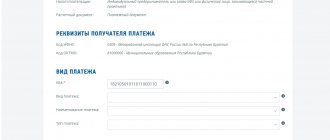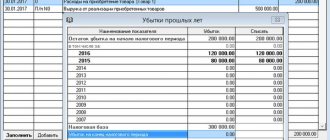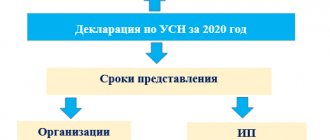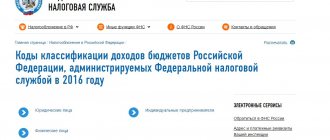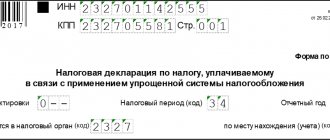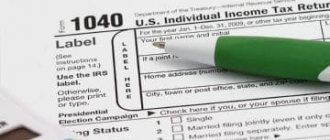Home — Documents
Organizations registered this year and wishing to use a simplified taxation system from the beginning of their business activities, like all other organizations already applying this special tax regime, in accordance with Art. 2 of the Federal Law of December 6, 2011 N 402-FZ “On Accounting” are required to keep accounting records in full. Before Law No. 402-FZ came into force, simplified organizations were required to keep accounting records only of fixed assets and intangible assets (Clause 3, Article 4 of Federal Law No. 129-FZ of November 21, 1996 “On Accounting”).
The reason for this exception was that, according to Art. 346.12 of the Tax Code of the Russian Federation did not have the right to apply a simplified taxation system for organizations for which, in particular, the residual value of fixed assets and intangible assets, determined in accordance with the legislation of the Russian Federation on accounting, exceeds 100,000,000 rubles. If before January 1 of this year, the “simplified” people were still asking the question about the need to draw up an accounting policy, now all doubts on this matter have disappeared. The set of ways an economic entity maintains accounting records constitutes its accounting policy. An economic entity independently forms its accounting policy, guided by the legislation of the Russian Federation on accounting, federal and industry standards (clauses 1 and 2 of Article 8 of Law No. 402-FZ). The basis for the formation of accounting policies for accounting purposes is contained in the Accounting Regulations “Accounting Policy of the Organization” (PBU 1/2008) (approved by Order of the Ministry of Finance of Russia dated October 6, 2008 N 106n). PBU 1/2008 provides a more expanded definition of the organization's accounting policies. This is understood as the set of accounting methods adopted by the organization - primary observation, cost measurement, current grouping and final generalization of the facts of economic activity (clause 2). The choice of one of the options for accounting methods for specific transactions proposed by regulatory documents, independent development of accounting methods and justification for deviations from the requirements of regulatory documents constitute the accounting policy of the organization.
Since to calculate the tax paid when using the simplified tax system with the object “income reduced by the amount of expenses”, the norms of Chapter. 25 “Organizational Income Tax” of the Tax Code of the Russian Federation, which, in turn, also provide for accounting options, then the simplified tax accounting policy of organizations with the specified object is also necessary.
Most often, the simplified taxation system is used by organizations with a small accounting staff (mostly only the chief accountant), so these organizations have a natural desire to simplify and bring together accounting and tax accounting as much as possible. Unfortunately, this is not always possible. Although for small businesses, including “simplified” ones, there are more opportunities, since they may not apply a number of accounting provisions, and they also have special provisions for the application of certain norms from individual PBUs, which make it possible to bring accounting and tax accounting closer together. (The criteria for classifying an organization as a small business are given in Article 4 of the Federal Law of July 24, 2007 N 209-FZ “On the development of small and medium-sized businesses in the Russian Federation.”)
Therefore, the accounting policy of the “simplified” person should begin with a list of regulations on the basis of which he will conduct his accounting. In addition to the aforementioned Law N 402-FZ, it should include the following regulations:
- Regulations on maintaining accounting and financial statements in the Russian Federation (approved by Order of the Ministry of Finance of Russia dated July 29, 1998 N 34n);
- Chart of accounts for financial and economic activities of organizations and Instructions for its application (approved by Order of the Ministry of Finance of Russia dated October 31, 2000 N 94n);
- list of accounting standards that will be used in accounting;
- Information of the Ministry of Finance of Russia N PZ-3/2012 “On a simplified system of accounting and financial reporting for small businesses”;
- methodological instructions and recommendations issued by the Ministry of Finance of Russia and other ministries and departments necessary in the work of the organization (this phrase can simply be transferred to the accounting policy without listing the instructions and recommendations).
Naturally, if both accounting and tax accounting policies are combined in one order, then the main tax document - the Tax Code of the Russian Federation - should also be indicated.
The accounting policy also specifies the persons responsible for organizing and maintaining accounting records. These are:
- manager - for organizing accounting, compliance with the law when performing business transactions and storing accounting documents (Article 7 of Law No. 402-FZ);
- chief accountant - for maintaining accounting records (Article 7 of Law No. 402-FZ) and developing accounting policies (clause 4 of PBU 1/2008).
We remind you that according to clause 3 of Art. 7 of Law N 402-FZ, an agreement on accounting can be concluded with an organization or specialist, and in small and medium-sized enterprises the manager can keep records independently. This should be taken into account when assigning responsibilities.
Paragraph 4 of PBU 1/2008 stipulates that, along with the selected accounting methods, the following are approved:
- a working chart of accounts containing synthetic and analytical accounts necessary for maintaining accounting records in accordance with the requirements of timeliness and completeness of accounting and reporting;
- forms of primary accounting documents, accounting registers, as well as documents for internal accounting reporting;
- the procedure for conducting an inventory of the organization’s assets and liabilities;
- methods for assessing assets and liabilities;
- document flow rules and accounting information processing technology;
- the procedure for monitoring business operations;
- other solutions necessary for organizing accounting.
The accounting policy should approve all primary documents used by the organization (clause 4, article 9 of Law N 402-FZ). This applies both to unified forms of primary documents approved by the resolutions of the State Statistics Committee of Russia, and to those independently developed. After all, unified forms of primary documents are no longer mandatory for use.
“Simplified” should also consolidate in the accounting policy the choice of option for accounting reporting forms, because Order of the Ministry of Finance of Russia dated July 2, 2010 N 66n for small businesses provides the right to choose between:
- common reporting forms;
- simplified general forms;
- forms intended only for small businesses.
From our point of view, for “simplified” people who have a small amount of accounting, it is preferable to use forms intended for small businesses.
Another mandatory element of accounting policy is the fixation of the selected object of taxation - “income” or “income reduced by the amount of expenses”.
In the next section “Methodology for maintaining accounting and tax records” of the accounting policy, you should list the accounting elements that the “simplified” will apply.
Accounting
For accounting purposes, the procedure for drawing up and the principles for forming in this part of the accounting policy in the simplified tax system “income” are exactly the same as in the general regime. Therefore, compiling this section usually does not cause any difficulties. It's quite simple. But there are several important aspects that need to be taken into account when creating the document. In particular:
- it is important to understand whether the company uses standardized document forms or generates their own samples;
- how the company determines the level of materiality (for example, when the accountant will have to take additional action);
- criterion for the value of objects as fixed assets;
- determine what method is used to calculate depreciation;
- methodology for assessing inventories for their write-off.
Also see “Accounting on the simplified tax system”.
Costs for delivery of goods
Clauses 6 and 13 of PBU 5/01 provide for options for accounting for costs for the procurement and delivery of goods to the organization’s warehouse:
- their inclusion in the cost of goods (account 41 “Goods”);
- accounting for them as part of sales expenses (account 44 “Sales expenses”) and writing them off in proportion to the sale of goods.
For the purposes of calculating tax under the simplified tax system , expenses directly related to the sale of goods, including costs of storage, maintenance and transportation, are taken into account as expenses after their actual payment (clause 2, clause 2, article 346.17 of the Tax Code of the Russian Federation). Accounting for these expenses does not depend on accounting for goods.
But even if the “simplifier” chooses the same option in both accounts (not including these expenses in the cost of the goods), it will not be possible to minimize the accountant’s work. Indeed, in accounting, the costs of procuring and delivering goods should be distributed between goods sold and those remaining in the warehouse.
Tax accounting
Everyone who has chosen the simplified special mode enters the necessary data into the Income and Expense Accounting Book. Using it, both the owner of the company and inspectors can track changes in one direction or another.
Also see “New form of book for accounting income and expenses for the simplified tax system from 2021: what has changed.”
As is known, under the simplified tax system with the object “income,” the tax base is determined without taking into account expenses. They are not taken into account. Therefore, the accounting policy of the simplified tax system for this object in terms of tax accounting is not mandatory at all. After all, the Tax Code in this case clearly regulates the procedure for accounting for income. This means that freedom of choice and any maneuvers within the framework of tax accounting of income are practically impossible.
An accounting policy document is needed when:
- you can choose a tax accounting option;
- there are gaps in the legislation.
Also see “Changes to the simplified tax system: what an accountant needs to know.”
The opposite situation occurs when the simplifier simultaneously works on imputation. In this case, it is necessary to separate operations within different special regimes. Let us explain why: for example, in both special regimes the final tax can be significantly reduced by deducted insurance premiums. Among them:
- directly insurance premiums;
- sick pay (the one at the expense of the simplifier);
- funds for voluntary personal insurance of employees.
To then avoid confusion and double accounting of expenses, you need an accounting policy for the simplified tax system “income” .
Also see “How to maintain separate accounting when combining simplified tax system and UTII.”
From what is described above, it is clear that maintaining tax records is a necessity for entrepreneurs and firms if they work simultaneously on simplified and imputed systems.
New accounting policy for 2021
The accounting policy is created once (within 90 days after registration of the company) and continues to be applied continuously - from year to year. There is no need to change the new accounting policy annually, but at the same time it may be necessary to make amendments and additions to it.
Amendments to the document are allowed only before the start of the next reporting period (year) and require certain grounds. These include:
- changing the methodology for any section in order to optimize accounting;
- changing the scope of the company’s activities, reorganization and similar procedures;
- changes in legislation in the field of tax and accounting (from the moment they come into force).
By the way, this was precisely the reason for the current amendments: in 2017, changes were adopted to PBU 1/2008 “Accounting Policies of the Organization.”
At the same time, the addition of the UE is not limited. When new types of activities appear and new items requiring accounting are added, there is no need to wait until the beginning of the next year: they can be entered and applied at any time.
Although the accounting policy does not need to be submitted to the tax authorities for approval, it may well be requested by the inspector during the audit.
Example document
Any accounting policy is based on direct norms of legislation - accounting and tax. Moreover: you can make direct references to the provisions of the Tax Code, orders of the Ministry of Finance, various PBUs, etc.
A standard sample accounting policy for the simplified tax system “income” should include:
- chart of accounts with which the accounting department will work;
- forms of primary accounting documents (own/established by law);
- internal control of business facts;
- accounting reporting forms;
- materiality criterion;
- determination of income, expenses and financial results;
- OS accounting;
- inventory accounting;
- accounting of goods, transportation and procurement costs and sales costs;
- accounting of administrative (general) costs.
on the correctness of drawing up the accounting policy of the simplified tax system . Basically, this responsibility lies with the chief accountant.
The following link provides a general example of an accounting policy for the simplified tax system “income” .
Read also
02.01.2018
Method of writing off raw materials and supplies
Clause 16 of the Accounting Regulations “Accounting for Inventories” PBU 5/01 (approved by Order of the Ministry of Finance of Russia dated 06/09/2001 N 44n) provides for the following valuation options when releasing inventories into production and otherwise disposing of them:
- at the cost of each unit;
- average cost;
- the cost of the first acquisition of inventories (FIFO method).
For the purposes of calculating tax according to the simplified tax system, material expenses are taken to reduce income received in the manner prescribed for calculating corporate income tax, Art. 254 of the Tax Code of the Russian Federation (clause 2 of Article 346.16 of the Tax Code of the Russian Federation). Paragraph 8 of this article provides for the following assessment methods when writing off raw materials and supplies used in the production (manufacturing) of goods (performance of work, provision of services):
- by cost per unit of inventory;
- average cost;
- cost of first acquisitions (FIFO);
- cost of recent acquisitions (LIFO).
Individual entrepreneur status
Registration of an individual entrepreneur imposes certain obligations on a businessman. This includes submitting tax returns, reports to various budgetary and extra-budgetary funds, sending notifications about the start of business activities, and maintaining accounting records. Individual entrepreneurs are obliged to follow the accepted taxation system in their activities. In accordance with this, he must make payments to the budget.
What kind of reporting does an entrepreneur submit in a simplified manner?
The law provides for the submission of an individual entrepreneur’s simplified taxation system declaration once per period. The period is limited to April 30 of the year following the reporting year. Delivery after the due date is punishable by a fine. At the same time, you should know that advance tax payments must be made every quarter at the rate of 6% of the income received in the previous quarter in the case of the simplified tax system “Income” and 15% in the case of the simplified tax system “Income minus expenses”.
To independently fill out a declaration for an entrepreneur on the simplified tax system “Income”, study the following recommendations:
- It is necessary to submit three sheets: title sheet, section 1.1, section 2.1.1.
- The TIN is affixed to each sheet.
- The page number is indicated on the 2nd and 3rd sheets.
- On the title (first) page, fill in the correction number (0 - if the document is submitted for the first time, 1 - if it is the second time after errors are identified); tax period code (34 - means that the declaration reflects information for the year); reporting year; tax authority code and location code; Full name, OKVED, telephone number; number of sheets and the number “1” in the “Taxpayer/taxpayer’s representative” field.
- Next, fill out the third page, where you indicate the cumulative total (that is, for three months, then for six months, then for nine months and for a year) income, tax rate, tax amount and the amount by which it is reduced.
- Now the values are entered on the second page, based on the calculations using formulas and the numbers reflected on the third sheet.
You can submit your declaration in person, by mail or via the Internet.
If you have problems filling it out, you can contact a specialized intermediary company, which will not only fill out the document without errors, but will also immediately send it electronically to the tax office.
How to fill out KUDiR
The reporting period takes the year or months when the entrepreneur received his status. If this happened, for example, in the second quarter, then the book begins to be kept from that time. A separate section must be allocated for each quarter. Data for the first quarter should be in the first section, the second should include figures for April, May, June and the total for six months, the third should reflect the amounts for July, August, September, as well as expenses and income for nine months, the fourth should include figures for October, November, December and annual.
Each page must contain the transaction number, its essence, the date and number of the supporting document and the amount for it.
A businessman should know the following:
- The book records only those expenses and income that are involved in calculating taxes, that is, those for which primary documents are available.
- If the simplified tax system “Income” is selected, then you are allowed not to enter expenses into the book, but to indicate only income.
Book design rules
The law allows you to maintain both paper and electronic versions of the document.
It is easier to make changes to the electronic version if errors are found. However, it is not prohibited to correct identified errors in the manual version; they must only be confirmed by the signature of the entrepreneur, his seal and the date of entry. At the end of the reporting period, the book must be kept for another four years. KUDiR should be submitted to the tax office only at the request of the inspector. The individual entrepreneur does not have to present the book along with submitting the simplified taxation system declaration. Before transferring it to the tax office upon request, if you kept computer records, you need to check that the KUDiR is stitched, numbered, and that the last sheet bears the seal of the individual entrepreneur with his signature. If you fill out the book manually, then the firmware and other manipulations must be done at the very beginning of the tax period.
It should be borne in mind that for each amount that is deposited in KUDiR, the entrepreneur must have confirmation. The first entry should reflect the first income or expense in the current tax period.
KUDiR must be filled out in Russian. If the primary document confirming expenses is in a foreign language, its translation is required. Expenses and income reflected in the book can only be recorded in rubles. The amount spent on a purchase in another currency must be recalculated at the exchange rate of the Central Bank of the Russian Federation on the day of purchase and entered in the appropriate line only in rubles.

